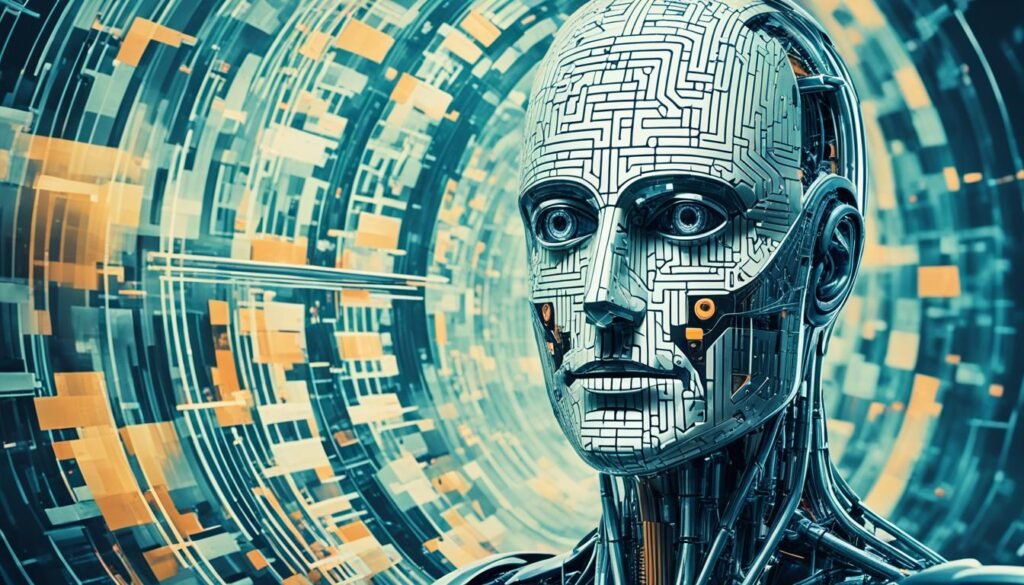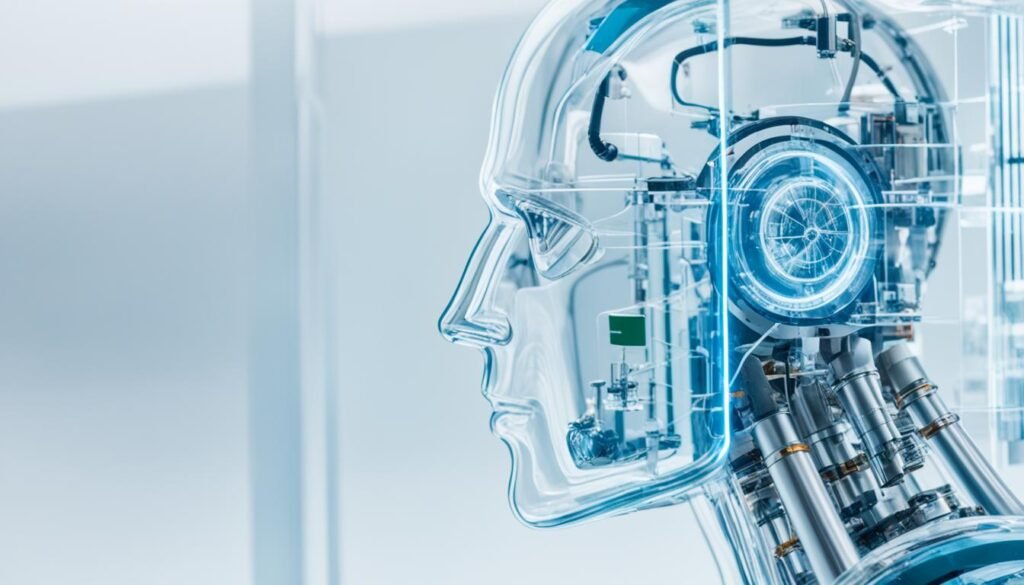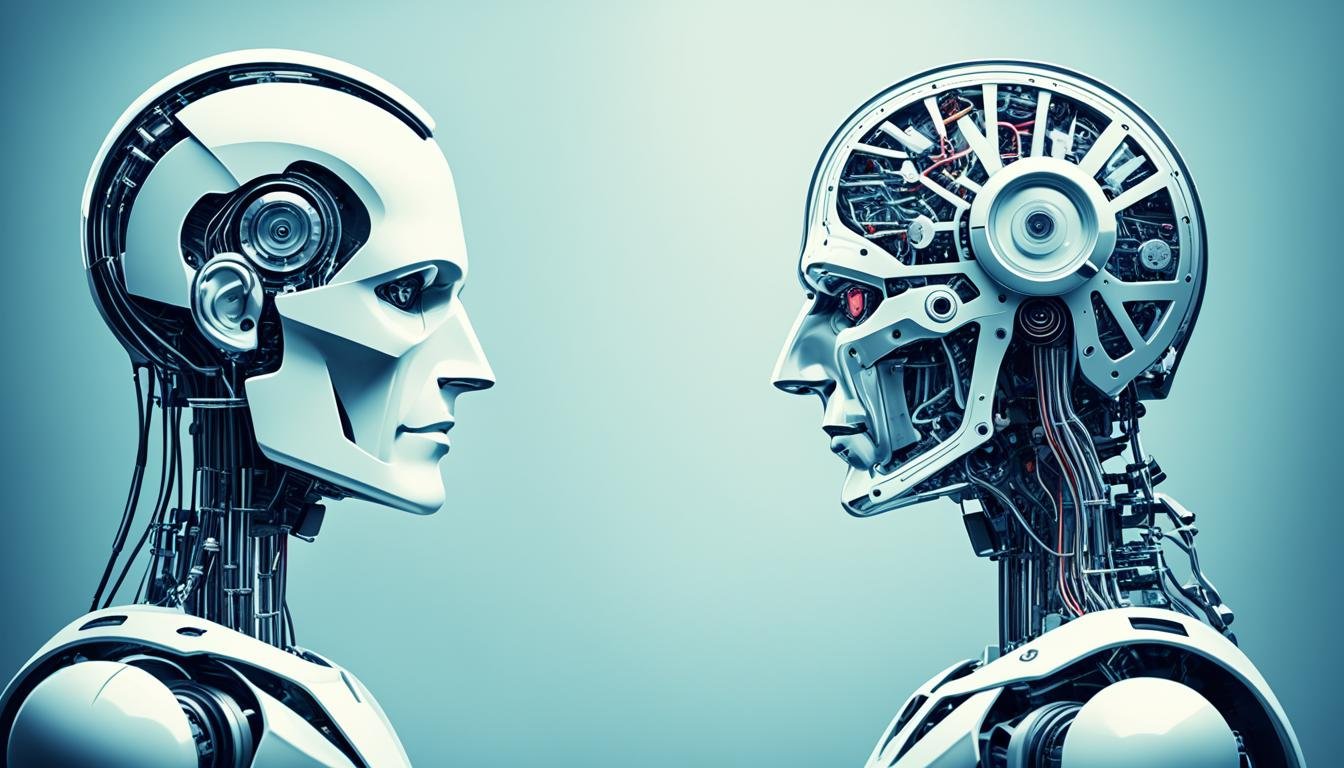In today’s fast-changing tech world, responsible artificial intelligence (AI) is key. It helps us match AI with what society values and expects. As AI grows, it could change lives for the better. But, it also brings up tough ethical questions.
These questions include issues like privacy and data security, fairness, and making AI clear and accountable. It’s important to focus on ethical AI development and use. This ensures AI helps everyone, not just a few.
Key Takeaways
- The AI ethics debate covers big topics like fairness, bias, privacy, transparency, and making AI answer for its actions.
- Creating responsible AI means making sure new tech matches ethical standards. This way, AI helps society and respects everyone’s rights.
- Working together is key. We need computer scientists, policymakers, and social scientists to tackle the complex AI ethics issues.
- Setting rules and teaching the public about AI are important steps towards using AI responsibly.
- Looking into AI’s effect on the environment and stopping its misuse are new challenges we must face in the AI ethics debate.
Introduction to Responsible AI
Artificial intelligence (AI) is changing many parts of our lives, but it also brings up big ethical questions. As AI grows faster, we need to focus more on responsible AI development. This means making sure AI is safe, trustworthy, and ethical. It also means being open about how AI works and working to reduce AI bias.
The Rise of AI and its Societal Impact
AI has changed how we live, work, and talk to each other. It has many benefits, but it also shows us we need to think about its ethical side. Issues like AI bias, privacy, and data security are becoming more important.
Defining Responsible AI: Aligning Innovation with Ethics
When we talk about responsible AI, we mean making sure new AI technology helps everyone. This means thinking about fairness, being clear about how AI works, being accountable, and protecting our rights. By focusing on these things, we can make the most of AI without its downsides.
| Key Principles of Responsible AI | Examples |
|---|---|
| Fairness | Addressing algorithmic bias to ensure equitable outcomes |
| Transparency | Providing explanations for AI-driven decisions |
| Accountability | Establishing clear lines of responsibility for AI systems |
| Privacy | Protecting personal data and respecting individual rights |
| Inclusiveness | Engaging diverse stakeholders in the design and deployment of AI |
By following the principles of responsible AI, we can use this powerful technology for good. This means we focus on the well-being of people and society. It’s about finding a balance between new ideas and doing what’s right, making sure AI matches our values and hopes.
Privacy and Data Security in AI
As AI becomes more common, keeping our personal info safe online is key. AI deals with huge amounts of data, making us wonder how our personal data is kept safe. Finding a balance between using data wisely and protecting our privacy rights is a big challenge.
AI’s ability to understand and predict human actions makes us worry about surveillance and misuse. Keeping our privacy safe and protecting sensitive data is vital. This builds trust in AI governance and responsible AI use.
Safeguarding Personal Information in the Digital Age
To tackle these issues, companies making and using AI must use strong data security steps and follow ethical personal data protection rules. This means:
- Clear rules on how data is collected and used
- Strong encryption and who can access data
- Regular checks on data and security
- Users having a say in their data
- Keeping security up to date and checking for risks
Putting privacy and data security first helps build trust in AI. This leads to responsible AI use and growth of this powerful tech.

“Maintaining end-user privacy and sensitive data is crucial for responsible AI governance.”
Bias and Fairness in AI Systems
In the fast-changing world of artificial intelligence (AI), bias and fairness have become big ethical worries. AI algorithms can pick up biases from the data they learn from, which might already have prejudices. This leads to unfair decisions in things like lending, hiring, and justice, making things worse for some groups.
Fixing fairness in AI is hard and involves many parts. Algorithmic bias can come from biased data, bad algorithms, or even the biases of the people making them. This can cause unfair treatment, discrimination, and leave some groups behind.
Experts and leaders are working hard to make AI fairer and reduce data bias. They suggest better data, fair algorithms, and diverse datasets. These steps are key to making inclusive ai and fair AI decisions.
“Biases in AI systems can lead to unfair outcomes and perpetuate existing inequalities, impacting critical sectors such as healthcare, employment, criminal justice, and credit scoring.”
Getting rid of algorithmic bias in AI is tough, but it’s important. By tackling these problems, we can make AI better for everyone. As AI grows, we must make sure it helps everyone, not just a few.
Working towards fair and unbiased AI is an ongoing effort. With focus, teamwork, and ethics, we can make AI a force for good for everyone.
Transparency and Accountability in AI Decision-Making
AI technologies are changing our world fast. We need them to be clear and answerable in how they make decisions. AI models, especially deep learning networks, are like “black boxes” because we can’t see how they decide things. This raises big questions about who is responsible, especially in areas like healthcare and self-driving cars.
It’s important that AI systems make fair decisions and that people understand them. This is a big challenge in the ethics of AI. We need to make AI more open so we can trust and hold it accountable.
Navigating the “Black Box” Challenge
AI algorithms are very complex, making it hard to make them clear and responsible. AI transparency and AI accountability are key to knowing how they work and making them answer for their choices.
Experts have some ideas to fix this:
- Using explainable AI (XAI) to show us why AI makes certain decisions.
- Creating rules and standards for AI to make sure it’s ethical.
- Working together between AI makers, users, and regulators to make AI more open and shared.
By solving the “black box” problem, AI can be more open, responsible, and trusted. This is vital as AI becomes more important in our lives and society.

“Transparency and accountability are key to trusting AI systems. We can’t trust them if we don’t know how they decide things.”
| Key Principles for Transparent and Accountable AI | Description |
|---|---|
| Explainable AI (XAI) | Techniques that provide insights into the reasoning behind AI decisions, making the decision-making process more transparent and understandable. |
| Algorithmic Accountability | Establishing clear guidelines and standards for the development and deployment of AI systems to ensure they align with ethical principles and can be held responsible for their actions. |
| Collaborative Oversight | Fostering collaboration between AI developers, users, and regulatory bodies to promote transparency and shared responsibility in the use of AI technologies. |
Principles of Ethical AI Development
The debate on ethical AI is growing, showing we need a strong ethical framework for AI’s development and use. Key guidelines like fairness, transparency, and privacy have come forward. These include non-maleficence, accountability, robustness, and inclusiveness too.
Fairness, Non-Maleficence, and Inclusiveness
At the core of ethical AI are fairness, non-maleficence, and inclusiveness. Fairness means AI can’t discriminate or show bias against people or groups. Non-maleficence aims to reduce harm and negative effects. Inclusiveness ensures AI considers diverse communities, avoiding the exclusion of some groups.
- Fairness: AI systems must be unbiased and fair, avoiding discrimination based on race, gender, age, or other protected characteristics.
- Non-maleficence: AI development should focus on safety and security, preventing unintended harm or negative outcomes.
- Inclusiveness: The AI ecosystem should support diversity and representation, making sure AI benefits everyone in society.
Putting these principles at the heart of ethical ai principles, responsible ai development, and ai ethics guidelines is key. It ensures ai best practices help society as a whole.
“Ethical AI development is not just a lofty ideal, but a necessary step to build trust and ensure that AI technologies serve the greater good.” – Dr. Emily Laidlaw, Professor of Law and Technology
Promoting Responsible AI Practices
As we welcome AI into our lives, it’s key to make sure it’s used right. This means thinking about ethics from start to finish. By working together, learning more, and having strong checks, we can make the most of AI safely.
Fostering Collaboration and Ongoing Education
For AI practices to be responsible, we need different fields to work together. Experts in AI should team up with ethicists, lawmakers, and users. This way, AI is made with an eye on what society needs and how it might affect us.
Keeping up with the latest in AI governance, AI ethics committees, and AI oversight is crucial. By always learning and sharing what we know, we can tackle ethical issues fast. This keeps people trusting in AI’s power.
Implementing Ethics throughout the AI Life Cycle
AI should be made with ethics in mind from the start. In design and development, focus on being fair, clear, and accountable. This means good data handling, checking algorithms, and clear rules for decisions.
Having strong AI oversight is also key. Companies should watch how their AI systems work, spot problems, and fix them quickly. By putting ethics at every step, companies can lead in responsible innovation and keep people’s trust.
“Responsible high governance is lacking in many companies,” according to Dr. Ricardo Baeza-Yates, a leading expert in responsible AI.
Getting AI right is tough, but working together, learning, and being ethical can help. This way, we can use AI’s power safely, protecting everyone and society.

ai ethics debate
The debate over AI’s ethics is key to moving forward safely. It helps us keep our values as we use more AI. Finding a balance between new ideas and being responsible is vital. This balance is the path we must follow, and it’s an ongoing process.
AI has many benefits – it can change industries, improve decision-making, and open new knowledge areas. But, its effects on society must be good for everyone. AI can cause job loss, carry biases, raise privacy issues, and create tough ethical choices. As we use AI, we must keep in mind that ethics guide us towards a future where progress and responsibility go hand in hand.
The ai ethics debate is complex, with strong points on both sides. We worry about losing jobs, privacy, biased decisions, superintelligent AI risks, and unequal effects on society. But, AI can greatly benefit society if we manage it right.
As we work on ai governance and ai regulation, we face big challenges. Ethical ai practices like being open, accountable, and having human checks are key. Working together between industry, schools, and government is vital. This ensures AI’s development and use match our ethical values and improve society.
“The AI ethics debate is not a hindrance to progress, but rather an imperative that safeguards our values and principles in an increasingly AI-driven world.”
Our path to responsible AI is continuous, and our choices today will shape our future. By engaging in the ai ethics debate and aiming for ethical ai, we can make the most of AI. This way, we keep the values that define us as humans.
Regulatory Frameworks for AI Ethics
AI systems are becoming more common, making it vital to have strong rules for their use. Governments and global groups are key in making sure AI is developed and used right. They work to balance innovation with protecting the public.
The Role of Governments and International Organizations
Worldwide, governments are setting rules for AI to make sure it’s used responsibly. They’ve set up groups to look at the ethical and social sides of AI.
In the U.S., a task force looks at how to lead in AI innovation while keeping ethics in mind. IBM has its own framework with a Policy Advisory Committee and an AI Ethics Board. They help make sure AI is ethical and follows rules.
Groups like the European Union, the United Nations, and the OECD are also working on AI rules. They want AI to be clear, answerable, and respect human rights and ethics.
| Organization | Key AI Ethics Initiatives |
|---|---|
| United States Government | Bipartisan Task Force on AI |
| IBM | AI Ethics Governance Framework |
| European Union | AI Regulation and Policy Frameworks |
| United Nations | AI Ethics and Principles Guidelines |
| OECD | Recommendations on AI Governance |
As AI grows, governments and global groups will play a big part in making sure it’s used right. They’ll help make sure AI is developed and used in a responsible way.
Real-World Examples of Responsible AI
AI is becoming more common, and companies are learning the value of using it responsibly. By following best practices, they make AI products safe and helpful. Let’s look at how different industries use responsible AI.
Promoting Fairness and Inclusivity
FICO, a top credit scoring company, uses AI to check creditworthiness. They make sure their models are fair and don’t unfairly affect certain groups. This shows their commitment to ethical AI use.
Ensuring Accuracy and Reliability
In healthcare, PathAI uses AI for diagnostics. They test and review their AI to make sure it’s accurate. This helps doctors make better decisions, which helps patients more. This shows how important responsible AI is in healthcare.
Promoting Diversity and Inclusion
IBM’s Watsonx Orchestrate helps make hiring fair by finding diverse candidates. It guides managers to value different viewpoints. This is a great example of how AI can make hiring better and more inclusive.
These stories from different fields show how responsible AI can make a big difference. By using AI ethically, companies can create products that help everyone.

| Company | Responsible AI Initiative | Key Outcomes |
|---|---|---|
| FICO | Regularly auditing credit scoring algorithms for bias | Improved fairness and inclusivity in creditworthiness assessment |
| PathAI | Rigorous clinical testing and peer-review of AI-powered diagnostics | Enhanced accuracy and reliability of medical decision-making tools |
| IBM | Utilizing AI to promote diversity and inclusion in hiring | Increased diversity of candidate pools and more equitable employment opportunities |
Ethical Challenges Ahead
As we move forward with AI, we must tackle the ethical issues that come with it. We need to work together, learn, and stick to ethical rules to make AI safe and trustworthy. The ai ethics challenges are big and complex. But if we stay alert and act fast, we can make sure innovation and responsibility go hand in hand.
Generative AI models are a big worry because they can make things look very real. This raises questions about being true to oneself, privacy, and misuse. We need strong rules for these technologies to be open, answerable, and protect our rights.
AI is getting into more areas of life, which means it could be biased or unfair. We must make sure AI treats everyone fairly and doesn’t discriminate. If AI makes biased decisions, it can affect many people and groups.
To deal with these ai ethics challenges, we need to keep teaching and working together. AI makers, lawmakers, and the public should all learn about ethical AI. By following ethical AI rules like fairness, openness, and being answerable, we can enjoy the good parts of emerging ai technologies without the bad.
The ai governance future will need everyone to work together. Governments, global groups, and business leaders must create strong rules. By thinking ahead about AI’s ethical sides, we can make sure it fits our values and helps society.
Conclusion
The debate over AI ethics is crucial, not a roadblock. It helps protect our values in a world with more AI. Finding a balance between innovation and responsibility is key. This journey is ongoing, and AI’s potential is huge.
As you use AI’s power, think of ethical thoughts as a guide. They help you aim for a future where progress and responsibility go hand in hand. The key to ai ethics conclusion is creating a system that supports ethical ai development. This ensures the responsible ai future we all want.
AI’s ethical and moral sides need careful thought and new rules. By working together, we can build the ethical base for AI’s growth. This includes talks between policymakers, experts, and the public.
FAQ
What is responsible AI?
Responsible AI means using AI safely and ethically. It makes sure AI helps everyone by following ethical rules.
What are the key ethical concerns in the AI debate?
The main worries are about privacy and keeping data safe, AI being unfair, and how it makes decisions.
How can we address algorithmic bias in AI systems?
We can fix bias by making AI decisions fair and inclusive. We also need to look at the data used to train AI.
Why is transparency in AI decision-making important?
Being open about AI decisions builds trust and makes people accountable. It’s key in areas like healthcare and self-driving cars.
What are the key principles of ethical AI development?
The main ideas are fairness, being clear, not causing harm, being responsible, keeping data private, being strong, and including everyone. These ideas should be part of AI’s core.
How can organizations promote responsible AI practices?
Companies can help by working together, teaching AI ethics, and making sure AI is ethical from the start. They should also watch over AI and protect users’ privacy.
What is the role of governments and international organizations in AI governance?
Governments and groups like the UN help make rules for AI. They make sure AI is developed and used responsibly.
Can you provide examples of companies implementing responsible AI practices?
Yes, companies like FICO and PathAI are good examples. FICO uses AI to check creditworthiness and checks for bias. PathAI’s AI tools are tested and reviewed to be accurate and reliable.
What are some of the emerging ethical challenges in AI?
As AI gets more advanced, we need to work together, learn, and stick to ethical rules. This will help make AI safe and trustworthy.
